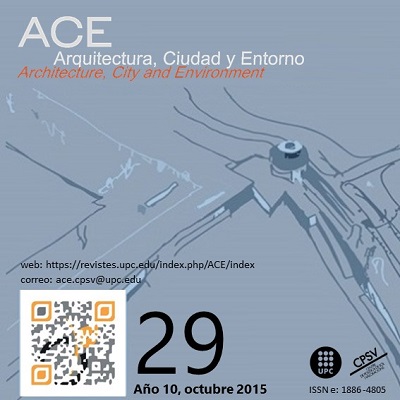Reasonable accommodation in the rehabilitation of housing estates: application to barrio Montserrat in Terrassa (Barcelona)
DOI:
https://doi.org/10.5821/ace.10.29.3693Keywords:
Reasonable accommodation, building retrofit, rehabilitation, accessibility.Abstract
The introduction of reasonable accommodation to facilitate universal accessibility in residential buildings has become crucial since the publication of the Law 8/2013 of June 26 on rehabilitation, regeneration and urban renewal. The complexity and cost of these processes is not easily combined with attention to the functional and dimensional requirements that people with disabilities and other groups with functional limitations require.
This article addresses this dilemma through reviewing the case of improving accessibility in the housing blocks of Barrio Montserrat in Terrassa, Barcelona, representative of many cheap housing estates constructed in the 50, 60 and 70 in Spain. A descriptive analysis of urban and building conditions in the neighborhood is performed through field analysis and comparison of the accessibility conditions to those required by the Spanish Building Code.
Stipulating what accommodations are legally considered as reasonable requires not only reviewing its technical feasibility, but knowing which elderly and disabled persons live in the building, residents' income levels and financial possibilities in order to pay for the necessary adaptations. All these conditions are studied for a Montserrat neighborhood block in order to discuss the applicability of reasonable accommodation, as established by Law 8/2013, to cases where the cost of accessibility intervention is very high in proportion to disposable income of residents.
Downloads
Published
Issue
Section
License
| INTELECTUAL PROTECTION CRITERIA |
At this moment, it is count with the "Oficina Española de Patentes y Marcas", while global protection it is being processed by the World Intelectual Property Organization (OMPI/WIPO). Nevertheless the International Standard Serial Number Office (ISSN) has given the following numbers ISSN: 1886-4805 (electronic version) and 1887-7052 (paper version). All articles will be peer reviewed, using double blind reviewing. |
| COPYRIGHT |
The article contents and their comments are authors exclusive liability, and do not reflect necessarily the journal editor commitee's opinion. All ACE published works are subject to the following licence CC BY-NC-ND 3.0 ES http://creativecommons.org/licenses/by-nc-nd/3.0/es/ It implies that authors do not hold nor retain the copyright without restrictions but only those included in the licence. |





































